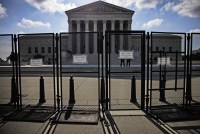Latest KFF Health News Stories
‘It’s Not a Haven’: With Limited Capacity for Abortion Care, Minnesota Clinics Brace for Influx
In Minnesota, where abortion rights are protected by the state’s constitution, legal doesn’t necessarily mean accessible. The state has just eight clinics that provide abortions, and both providers and advocates say resources available aren’t enough to meet demand as nearby states reduce abortion access.
Five Things to Know Now That the Supreme Court Has Overturned Roe v. Wade
By undoing that landmark decision, the law of the land since 1973, the court has empowered states to set their own abortion restrictions — so where people live will determine their level of access.
A Post-‘Roe’ World in Georgia Will Mean More Restrictions — And More Political Battles
Abortion will almost certainly face new restrictions in Georgia. Patients will have a harder time finding services, and providers will have to figure out how to navigate the new landscape. Meanwhile, abortion opponents see the moment as an opportunity to put further restrictions on the procedure.
Conservatives on Supreme Court, as Expected, End Nationwide Right to Abortion
The 6-3 decision, telegraphed in May by an unprecedented leak of a draft opinion, eliminates the right to abortion as if it never existed at all.
Tribes Show Little Interest in Offering Abortions on Reservations Despite Speculation They Could
The notion that Native American nations could use tribal sovereignty to bypass state restrictions on abortion if Roe v. Wade falls is an idea largely proposed by non-Native groups.
Medi-Cal Will Cover Doulas at More Than Twice California’s Initial Proposed Rate
Under a budget passed by California lawmakers, the state will pay nonmedical workers who assist in pregnancy and labor up to $1,154 per birth through Medi-Cal, which is up significantly from Gov. Gavin Newsom’s initial offer of $450. Though it’s more than what most other states pay, many doulas say it falls short of the $3,600 they sought.
Two Tennessee Abortion Clinics, Awaiting High-Court Ruling, Grapple With Uncertainty
The landmark Roe v. Wade decision could soon be overturned. Two Knoxville-based providers of reproductive health care wonder how — and if — they will continue to serve their patients.
KHN’s ‘What the Health?’: Taking a Shot at Gun Control
The U.S. House passed a package of bills seeking to keep some guns out of the hands of children and teenagers, but its fate in the Senate remains a big question mark. Meanwhile, the Federal Trade Commission takes on drug and hospital prices. Alice Miranda Ollstein of Politico, Anna Edney of Bloomberg News, and Joanne Kenen of the Johns Hopkins Bloomberg School of Public Health and Politico join KHN’s Julie Rovner to discuss these issues and more. Also this week, Rovner interviews Cori Uccello of the American Academy of Actuaries about the most recent report from Medicare’s trustees board.
Misinformation Clouds America’s Most Popular Emergency Contraception
At a moment when half of U.S. states stand poised to outlaw or sharply curtail abortion services, the nation’s most popular emergency contraception brand rests in the unlikely stewardship of two private equity firms.
Black Women Have Much at Stake in States Where Abortion Access May Vanish
For many women, abortion access has also meant better economic opportunities. But that could change in states that plan to ban most abortion access if the Supreme Court overturns Roe v. Wade. And those constraints could have a big impact on Black women. In Tennessee, Black women have abortions at more than four times the rate of white women.
Conservative states are moving to severely restrict abortions, and many are pressing for bans that provide no exception for cases of rape or incest or even to save the life of the mother. But public opinion polls suggest those limits could cause blowback.
KHN’s ‘What the Health?’: A(nother) Very Sad Week
Two mass shootings in two weeks — one at a Texas elementary school that killed 19 fourth graders and two teachers — have reignited the “guns-as-public-health-problem” debate. But political consensus seems as far away as ever. Meanwhile, the FDA is in the congressional hot seat over its handling of the infant formula shortage. Joanne Kenen of the Johns Hopkins Bloomberg School of Public Health and Politico, Anna Edney of Bloomberg News, and Rachana Pradhan of KHN join KHN’s Julie Rovner to discuss these issues and more. Also this week, Rovner interviews Dr. Richard Baron, head of the American Board of Internal Medicine, about how doctors should discipline colleagues who spread medical misinformation.
KHN’s ‘What the Health?’: Waking Up to Baby Formula Shortage
The nationwide shortage of baby formula, which has been simmering for months, finally burst into public consciousness as more parents become less able to find food for their babies, prompting a belated federal response. Meanwhile, covid-19 cases rise but prevention activities don’t, and abortion-rights backers ready their legal arsenal for a post-Roe world. Alice Miranda Ollstein of Politico, Tami Luhby of CNN, and Rachel Cohrs of Stat join KHN’s Julie Rovner to discuss these issues and more. Plus, for extra credit, the panelists suggest their favorite health policy stories of the week they think you should read, too.
KHN’s ‘What the Health?’: The Invisible Pandemic
Covid cases are again climbing, but you wouldn’t know it from the behavior of public health and elected officials, much less the general public, all of whom seem to want to put the pandemic in the rearview mirror. Meanwhile, the fallout over the leaked Supreme Court draft opinion on abortion continues even as the Senate fails — again — to muster the votes to write abortion rights into law. Joanne Kenen of the Johns Hopkins Bloomberg School of Public Health and Politico, Alice Miranda Ollstein of Politico, and Sandhya Raman of CQ Roll Call join KHN’s Julie Rovner to discuss these issues and more. Plus, for extra credit, the panelists suggest their favorite health policy stories of the week they think you should read, too.
Ripple Effects of Abortion Restrictions Confuse Care for Miscarriages
In Texas, where anyone can face a hefty fine of at least $10,000 if they abet an abortion, medical professionals on the front lines face tough quandaries when treating patients who have a miscarriage, a scenario that could soon play out around the country if abortion restrictions tighten.
1931 State Law Makes Abortion a Felony if ‘Roe’ Falls, Warns Michigan Attorney General
Dana Nessel, the Democratic attorney general of Michigan, said she would not have the authority to keep county prosecutors from enforcing the old law. Nessel also discussed the “selective reduction” abortion she had when pregnant with triplets.
KHN’s ‘What the Health?’: Leaked Abortion Opinion Rocks Washington’s World
The unprecedented early leak of a Supreme Court draft opinion that would overturn the landmark abortion-rights ruling Roe v. Wade has heated the national abortion debate to boiling. Meanwhile, the FDA, after years of consideration, moves to ban menthol flavors in cigarettes and cigars. Joanne Kenen of the Johns Hopkins Bloomberg School of Public Health and Politico, Shefali Luthra of the 19th, and Jessie Hellmann of CQ Roll Call join KHN’s Julie Rovner to discuss these issues and more. Plus, Rovner interviews KHN’s Paula Andalo, who wrote the latest KHN-NPR “Bill of the Month” episode about a family whose medical debt drove them to seek care south of the border.
What’s Next if ‘Roe v. Wade’ Falls? More Than Half of States Expected to Ban or Restrict Abortion
If the Supreme Court affirms the leaked draft decision and overturns abortion rights, the effects would be sweeping in states where Republican-led legislatures have been eagerly awaiting the repudiation of a woman’s right to terminate a pregnancy.
Historic ‘Breach’ Puts Abortion Rights Supporters and Opponents on Alert for Upcoming Earthquake
An opinion published by Politico confirms what many who have followed the abortion debate already suspected: Roe v. Wade is soon to be no more. But the question remains: How will the public respond?
KHN’s ‘What the Health?’: More Covid Complications for Congress
Congress is back in session, but covid diagnoses for Vice President Kamala Harris and two Democratic senators have temporarily left the Senate without a working majority to approve continued covid funding. Meanwhile, opponents of the Affordable Care Act have filed yet another lawsuit challenging a portion of the law, and we say goodbye to the late Sen. Orrin Hatch of Utah, who left a long legacy of health laws. Rachel Cohrs of STAT News, Anna Edney of Bloomberg News, and Rebecca Adams of KHN join KHN’s Julie Rovner to discuss these issues and more.





















